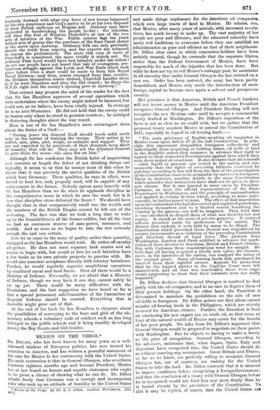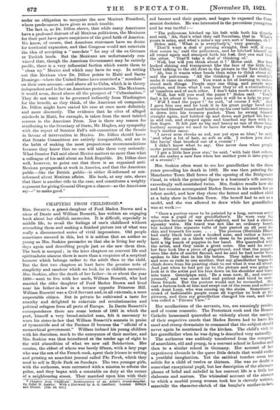MEXICO ON '1171E VERGE.*
Da. DILLON, who has been known for many years as a well- informed student of European politics, has now turned his attention to America, and has written a powerful statement of the case for Mexico in her controversy with the United States. His main contention is that in General Obregon, who overthrew Carranza eighteen months ago and became President, Mexico
has at last found an honest and capable statesman who ought to be given a chance of showing what he can do. Dr. Dillon admits freely that Carranza was a corrupt and incompetent ruler who took up an attitude of hostility to the United States • Mexico on the Verge. By Dr. E. J. Dillon. London: Hutchinson. [21s. net.)
and made things unpleasant for the American oil companies, which own large tracts of land in Mexico. He admits, too, that Mexico, after many years of misrule, with incessant revolu- tions, has much leeway to make up. The vast majority of her people are poor and illiterate, and the educated minority have many evil traditions to overcome before they can establish an administration as pure and efficient as that of their neighbours. Dr. Dillon cites cases in which concession-holders have been unfairly treated, though he contends that the separate States, rather than the Federal Government of Mexioo, have been responsible for much of the injustioe that has been done. But while he does not try to veil Mexico's unhappy past, he maintains in all sincerity that under General Obregon she has entered on a new era. Order has been restored, the army has been partly demobilized, and Mexico only needs tho introduction of more foreign capital to become once again a solvent and prosperous country.
Her grievance is that American, British and French bankers will not invest money in Mexico until the American President recognizes General Obregon. And President Harding will not recognize the new Mexican ruler until he accepts a commercial treaty drafted at Washington. Dr. Dillon's exposition of the facts is not so clear as we could wish, but we gather that the proposed treaty requires Mexico to amend the Constitution of 1917, especially in regard to oil-bearing lands :-
" The main grievance of English-speaking oil magnates in Mexico turns upon Article 27 of the last Constitution. In prin- ciple this enactment disqualifies foreigners collectively and individually from acquiring or holding mines, oil wells or land in the Republic unless they renounce in advance their right to appeal to their respective Governments against laws which they may deem unjust or vexatious. It also declares that all minerals —solid, liquid or gaseous—are vested in the nation and con- sequently that the rights of ownership hitherto conferred by purchase according to law will from the date of the promulgation of the Constitution cease to be attainable by natives or foreigners. There is, however, another Article in the same Constitution which provides that retroactive force shall not be given to these new canons. But it was ignored in some cases by President Carranza, as were the official representations of the State Department in Washington, and the principle of nationalization was applied in certain decrees which, according to some juris- consults, he had no power to isSue. The-effect of that innovation upon the outlanders who had discovered and exploited petroleum, enriching themselves and to a limited extent benefiting the country in the process, can well be imagined. They held that it was calculated to despoil them of what was theirs by law and equity. It struck at the roots of private property. It violated solemn promises made by spokesmen of the nation. The decrees that embody it were held by many to bo illegal. The Constitution which provoked those decrees was stigmatized by certain jurisconsults as a violation of the preceding Constitution and therefore devoid of legal force. The protests from Washington, London and Paris nullified in advance the appli- cation of those decrees to American, British and French citizens. But with Carranza these considerations went for naught. Be held that oil having acquired a wholly new value, the Govern- ment, in the interests of the nation, can readjust the terms of the original grant. Some oil-bearing lands duly purchased ho wrested from their rightful owners. Appeals for protection filed by the injured parties in the Supreme Court were left unanswered, and all that was vouchsafed these were argu- ments purporting to show that their interests were not really impaired.'
Dr. Dillon declares that General Obregon is resolved to deal justly with the oil companies, and in no case to deprive them of their present holdings. On the other hand, the President is determined to maintain the prohibition on the sale of new oil-fields to foreigners. Dr. Dillon points out that aliens cannot acquire oil-bearing lands in the Philippines, which are strictly reserved for American citizens. Further, the President is bent on continuing his new export tax on crude oil, so that some at least of the natural wealth of Mexico may enure for the benefit of her poor people. We infer from Dr. Dillon's argument that General Obregon would be prepared to negotiate on these points with Washington. But he objects to having to make a treaty as the price of recognition. General Obregon, according to his advocate, maintains that, when Japan, Spain, Italy and Argentina have recognized him, the United States should do so without exacting any recompense. Great Britain and France, so far as we know, are perfectly willing to recognize General Obregon but, out of courtesy, are waiting for the United States to take the lead.. Dr. Dillon contends that it is unusual to impose conditions before recognizing a foreign Government, and that the conclusion of a treaty with General Obregon before he is recognized would not bind him any more firmly than ho is bound already by the provisions of the Constitution. To
this it may be replied, of course, that the United States are
under no obligation to recognize the new Mexican President, whose predecessors have given so much trouble. The fact is, as Dr. Dillon shows, that while many Americans have a profound distrust of all Mexican politicians, the Mexicans for their part have grave suspicions of the good faith of America. Wo know, of course, that American statesmen have no desire for territorial expansion, and that Congress would not entertain the idea of accepting a " mandate " for any of the ex-German or Turkish lands. But the Mexicans are unfortunately con- vinced that, though the American Government may be entirely pacific, there is a very influential faction which wants them to " clean up " Mexico and which may have its way. In setting out this Mexican view Dr. Dillon points to Haiti and Santo Domingo—where the United States have exercised a " mandate " on their own account—and above all to Cuba, which is in theory independent and in fact an American protectorate. The Mexicans, it would seem, dread above all the prospect of " Cubanization." They do not want to be governed indirectly from Washington for the benefit, as they think, of the American oil companies. Dr. Dillon might have stated his case at once more definitely and more discreetly. The evidence that he cites of alleged misdeeds in Haiti, for example, is taken from the most tainted sources in the American Press. Nor is there any reason for attributing to the Secretary of State, Mr. Hughes, any sympathy with the report of Senator Fall's sub-committee of the Senate in favour of intervention in Mexico. Dr. Dillon should know that Senate Committees are entirely irresponsible, and are in the habit of making the most preposterous recommendations because they know that no one will take them very seriously. What Senator Fall said about Mexico matters no more than what a colleague of his said about an Irish Republic. Dr. Dillon does well, however, to point out that there is an organized anti- Mexican propaganda at work in America, and that the American public—like the British public—is either ill-informed or mis- informed about Mexican affairs. His book, at any rate, shows that there is another side to the case, and constitutes a weighty argument for giving General Obregon a chance—as the Americans say—" to make good."







































 Previous page
Previous page